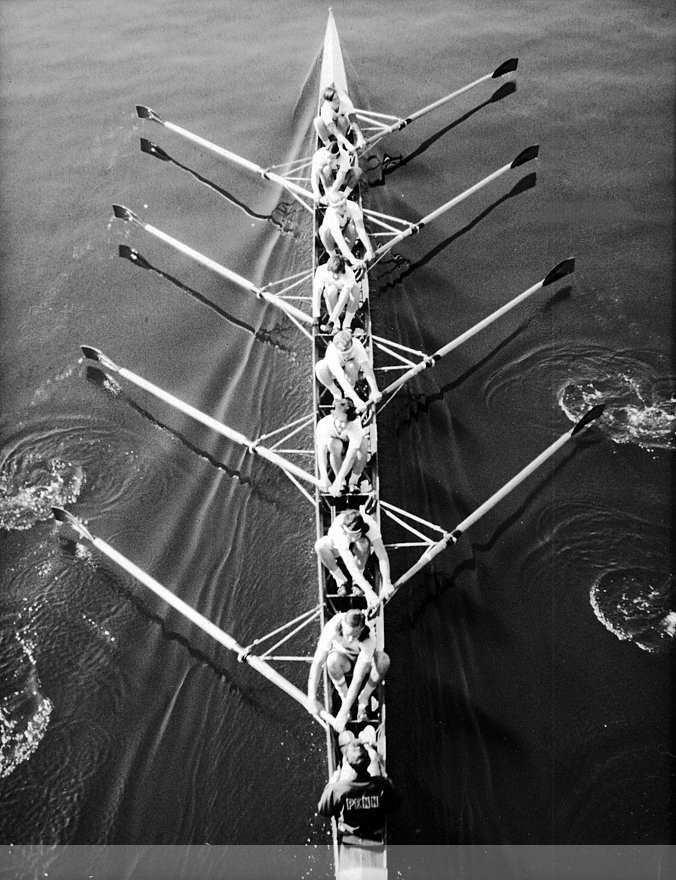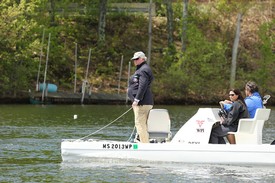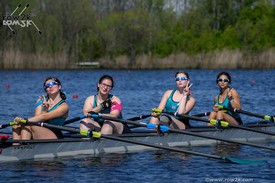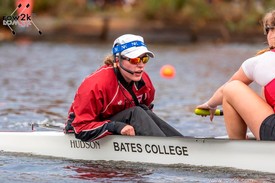
In 1971, Harvard had beaten my Penn Freshman Lightweights at the "Broken Centerbolt" Sprints. This year of 1972, my 27th on Earth, my 13th in the family of rowing, it will be Princeton's turn to best my Penn crew. This year the Princeton Lightweights are being coached by F. Fairthington Farthington, University of Pennsylvania Class of 1963, a fellow Quaker, tortoise-shell glasses with thick lenses, weak jaw line, shock of hair across his forehead that he regularly brushes aside like Bobby Kennedy used to. He seems so distant, formal, intellectual, intense . . . and intensely preppy.
And having read Road & Track Magazine cover to cover since the day I ran away from Kent School in the middle of the night in my roommate Robb Carr's dad's red MGA 1600 2-seater British roadster with Dunlop tires on knock-off wire wheels, silently and surreptitiously rolled from its garage in Torrington, Connecticut in the middle of the night, I can't get over how much Fairthy looks like Masten Gregory, an American who drove Grand Prix cars in Europe during the 1950s, when race car drivers were real men and died in their race cars with regularity. Masten Gregory indeed died in his race car and is remembered fondly, even today.
I have actually known who Fairthy Farthington is for quite a long time. When I was a Penn freshman at the age of 19 and had yet to grow tall and robust enough to row, I had coxed for him one winter morning in 1964. Is this a small world or what?
Fairthy was training for the Tokyo Olympic Trials with a bunch of other recent Penn grads. Among them was Frank Shields, who a year later would impregnate his future ex-wife, and out would pop Brooke Shields, of all people!

Brooke grew up tall and robust enough to follow in her father's footsteps and row for Penn, but, wouldn't you know it, instead she went to Princeton and pursued other options.
I met Brooke a few years ago in a theater in West L.A. and told her that even though he had passed away many years ago her father remains beloved in the American rowing community. You see, he started the annual Power 10 Dinner in New York, a formal occasion that is the social event of the year for many rowers. She teared up and told me I had made her day. Needless to say, she had actually made mine.
A generation earlier, the famed ventriloquist Edgar Bergen, a regular on the Ed Sullivan Show on Sunday nights on CBS at 8PM during my youth, didn't send his wooden dummy Charlie McCarthy to college, but he did send his real-life daughter Candice to college, and the college they picked was none other than the University of Pennsylvania!
People called her "Cappy" back then, and she was already a famous fashion model who appeared regularly on the covers of Vogue and Mademoiselle magazines. She became a classmate of mine. We are fellow Quakers, Class of '67. I even called her once during freshman year and asked her out as one of my fraternity prank pledge tasks. She turned me down without hesitation or malice, much to my relief, and then we had a pleasant conversation over the phone. She didn't have to be, but she was very nice.
I met her at a party some years back - one of the benefits of living in Los Angeles, California, running into the likes of Brooke Shields and Candice Bergen - and I told her "our" story. Not surprisingly, she had no memory at all of my phone call, by then more than half a century in the past, but again she was very gracious.
Candice Bergen is quite tall, you know, tall and robust enough to have rowed for Penn in her youth. Just the way Brooke would turn out a generation later. But Cappy Bergen didn't row either. Pursued other options, thank you very much.
Anyway, the Princeton Lightweight Freshmen absolutely crush everyone this spring of 1972. After relegating my fine crew to second place (again!) at the Eastern Sprints, they go on to the IRA Championships and win the freshman heavyweight coxed-fours event, to my knowledge, a feat unequaled before or since. They're that good! No shame in finishing second to them!
Now Princeton Varsity Lightweight Coach Fairthy Farthington is a singular fellow. He never looks anyone straight in the eye through those glasses of his, but during the course of the year we become rather good friends.
Fairthy is the first person to get me to really think about coaching as a professional avocation. He introduces me to the writings of Doc Counselman, the legendary Indiana University Swim Coach, proponent of applying the tools of science to athletic training, and to Arthur Lydiard, a running coach from New Zealand who stresses long-distance training at sub-maximal levels. In this era every other rowing coach in America is in love with 500-meter interval bursts at higher-than-race pace. Just like the Undine Barge Club lightweights and the Vesper Boat Club heavyweights in 1965.
Fairthy opens the door to new dimensions in my understanding of the sport. He becomes a mentor, a father figure of sorts to me. During the year, Fairthy also shares with me his plans to organize a 1972 summer European tour for a U.S. composite lightweight squad: an eight, a coxless-four and a single sculler. FISA, the international rowing federation now called World Rowing, is on the brink of officially adding these lightweight events to the World Championship schedule, and our initiative might just tip the scales for 1973.
Am I interested? You bet I am! After my performance in the dash the previous summer I have forgotten all about the Curse of the Jayvee Scar, about boat movers and boat stoppers. I am about to turn 27 years of age, running and lifting like never before, and even spinning that new-fangled invention from Australia, the ergometer, just about as well as any lightweight around, anyone except my former freshman phenomenon, Mic Feld. Mic, having just finished his sophomore year at Penn, is in a class by himself in America. Nevertheless, I am anxious to take on the world, and with Mic in my boat, thank you very much.
Fairthy arranges everything: the selection camp at Harvard, the airline flights, the entries in regattas in West Germany, Denmark and Austria, transportation, lodging, everything, but he can't actually accompany the team himself. Some personal or family conflict or something that summer. Fairthy even puts the athlete selection before we leave the States into the hands of Steve Gladstone, the Harvard Lightweight Coach, undefeated for many years by now – Harvard under his guidance having supplanted Cornell as the premier lightweight program in America.
And he even gets me to agree to act as rower/boatman/manager/VW Combi driver in Europe. Concierge, if you will.
"À votre service, monsieur."
To be continued . . .
If you enjoy and rely on row2k, we need your help to be able to keep doing all this. Though row2k sometimes looks like a big, outside-funded operation, it mainly runs on enthusiasm and grit. Help us keep it coming, thank you! Learn more.
Comments | Log in to comment |
There are no Comments yet
| |
- Bont Rowing
- Calm Waters Rowing
- Concept 2
- Craftsbury Sculling
- The Crew Classic
- CrewLAB
- Croker
- Dad Vail Regatta
- Durham Boat Co.
- Empacher
- Faster Masters
- Filippi
- Fluidesign
- h2row.net
- HUDSON
- Live2Row Studios
- Nielsen-Kellerman
- Oak Ridge RA
- Peinert Boat Works
- Pocock Racing Shells
- Race1 USA
- Rockland Rowing Masters Regatta
- RowKraft
- Rubini Jewelers
- Vespoli USA
- WinTech Racing
- Bont Rowing
- Calm Waters Rowing
- Concept 2
- Craftsbury Sculling
- The Crew Classic
- CrewLAB
- Croker
- Dad Vail Regatta
- Durham Boat Co.
- Empacher
- Faster Masters
- Filippi
- Fluidesign
- h2row.net
- HUDSON
- Live2Row Studios
- Nielsen-Kellerman
- Oak Ridge RA
- Peinert Boat Works
- Pocock Racing Shells
- Race1 USA
- Rockland Rowing Masters Regatta
- RowKraft
- Rubini Jewelers
- Vespoli USA
- WinTech Racing

















